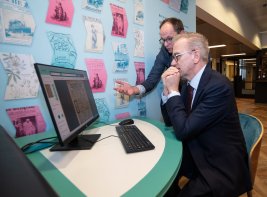Developing new technologies and methods that make digital services more easily accessible to people with disabilities. This is the aim of the TACIT research project, which will be conducted over the next five years under the leadership of TU Delft. The KB is a partner in this project.
TACIT
One in four Dutch people have a disability. These are people with visual or hearing impairments, as well as those with intellectual or social disabilities. It is still often difficult for these people to access information, which is why the TACIT research consortium will develop new technologies for them. This includes artificial intelligence, virtual and augmented reality to make digital services more accessible to people with disabilities.
In the past, accessibility programmes for these target groups were often developed without involving the users. The research programme uses co-design as its starting point: technology development based on intensive collaboration between the researcher and the expert through experience. The researcher does not need to have personal experience with a disability, but involves the user early in the concept phase, rather than afterwards. TACIT will also collaborate with various accessibility organisations to help ensure that the accessibility gap is better understood and reduced.
Broad collaboration
TACIT is a broad collaboration between many different partners. In addition to the KB and TU Delft, they include Centrum Wiskunde & Informatica, Eindhoven University of Technology, University of Amsterdam, Hogeschool Utrecht, University of Utrecht, Berengroep, Envision Technologies, SeysCentra, TKH Artificial Intelligence, Nederlands Instituut voor Beeld & Geluid, Stichting Kickstart.AI, Koninklijke Auris Groep, Nederlands Gebarencentrum and Stichting Accessibility.
Digital accessibility is an important point on the KB's research agenda. Thanks to the Aangepast Lezen (modified reading) programme, the KB already has a lot of knowledge and a large network relating to visual impairments. This knowledge is highly valuable to the TACIT project. The KB is also contributing part of the € 3.2 million grant to the project.




